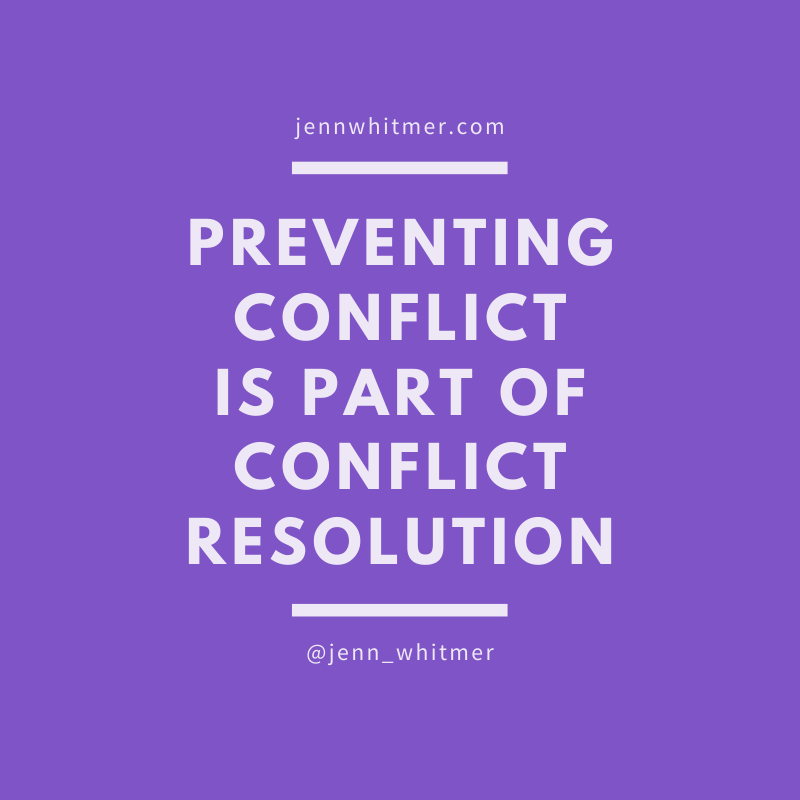My week is crazy. Anyone else? (And a thousand hands go up). And next week ain’t looking any better.
- Deadlines out of my control.
- Clients changing goals.
- Studying routines to keep.
- Big decisions to make.
- Teenagers to parent.
- Oh, and it’s December…
As you may have discovered in your life, when the margin is decreasing and life is falling off your already full pate, conflicts tend to flare and spread faster than a TNT fuse in a cartoon.
It’s like a little spat at home over who left the mug in the sink or eye-rolling in the office because someone is late to a meeting suddenly becomes part of a pile of difficulty. And I just don’t need that right now, Thank You VERY MUCH!
When the margin is decreasing and life is falling off your already full pate, conflicts tend to flare.
Part of conflict resolution is managing the typical causes of conflict, such as scheduling, miscommunication, unclear purpose and activities, or personality dynamics. When life is full, we often ignore those simple causes and get stuck in an unnecessary or unproductive conflict.So in the middle of busyness and hurry and muchness and manyness, how do we prevent conflict?
Three Things to Know and Do to Prevent Unnecessary Conflict
Know what is going on and talk about it.
This may seem counterintuitive, but status conversations are more valuable when life and work are moving like a hyperspeed train. At work and at home, have an overview of what’s happening for the month, the week, and the day.
While this is always a good practice, in times of high activity, these status meetings keep everyone communicating about what is happening. New events, unexpected projects, and changed deadlines seem to come flying in from all over. Schedule the time to make sure you, your colleagues, and your family are all working from the most updated flight plan.
Weekly: Plan 15 minutes on Sunday night (or start tonight!) to go through the events and projects of the week. Write it all down somewhere: a dry erase board, a notebook, your iCalendar, post-it notes by days on the fridge.
Daily: Take 5 minutes to go through the information for the day. For work, I found the first hour of the day is a good time for this stand-up meeting. Literally, stand up–if you sit you’ll get off task. At home, that is not a task I’m ready for at breakfast. So we tend to do it the night before.
In person is always best, but at times an email or text will do the trick. This intentional time up front will save you from unnecessary and unexpected conflict.
Know the goal and adjust the methods.
Sometimes traditions can get in the way. The pressure to do what you’ve always sometimes takes over better judgment.
As you go through the events, it’s easy to feel squeezed and anxious. When it all becomes overwhelming, take a moment to consider what the goals are. Then ask if that event or project meets that goal at this time. Take in the context and make some choices. Maybe this year, the neighborhood cookie exchange doesn’t need you to host, make food, and bake cookies? If the goal is a good time with neighbors, do it in a different way—watch a movie together. Change the method.
The same applies for projects and activities at work. Meet the goals you have, but adjust how you get there to meet the needs. (And please, if you are the leader, don’t expect people to work extra because there is time off coming. Account for that in your planning.)
Adjusting the method saves you from resentment and explosive conflict that comes from too much pressure.
Know what you need and ask for it.
We each have core motivations that influence our behavior. During busyness, we revert to the easiest way of being, often losing our filters, self-awareness, and our ever-lovin’ minds in the process.
And everyone else around us is doing the same from a different motivation. We cannot expect others to read our minds and just intuit what we need.
Understanding those core motivations can help you make informed requests when you find yourself falling into an unhealthy pattern. An Enneagram Five will have a different need than a Three. (Be brave Fives! Your needs are not a problem!)
I identify with the Enneagram Seven. Using me as an example, I need to be aware when I find myself mentally running from thing to thing and feeling like I have to take care of it all. That is a big flashing sign I’m starting down a bad spiral. And not the tornado slide fun kind. I can use that knowledge to ask for what I need.
I may say to someone close to me, “I’m feeling like I have to take care of everything. Can you help me by doing this?”
I may say to someone not so close to me, “I am getting scattered. Can you do this task?”
Asking for what you need may look different for you, and I encourage you to bravely ask for what you need. If you are unsure, ask what others need in this time. It will save so much unnecessary conflict from people guessing and few needs getting met. (If you are unsure of some of your core motivations, you can download my free eBook Enneagram Core Motivations.)
Conflict resolution begins with good communication to prevent unnecessary conflict.
Do you find these little arguments creep up on you? How do you cope?

COMMENTs:
0